人教版必修三Unit 1 Festivals and Celebrations Reading for Writing 课件(共39张PPT)
文档属性
| 名称 | 人教版必修三Unit 1 Festivals and Celebrations Reading for Writing 课件(共39张PPT) | 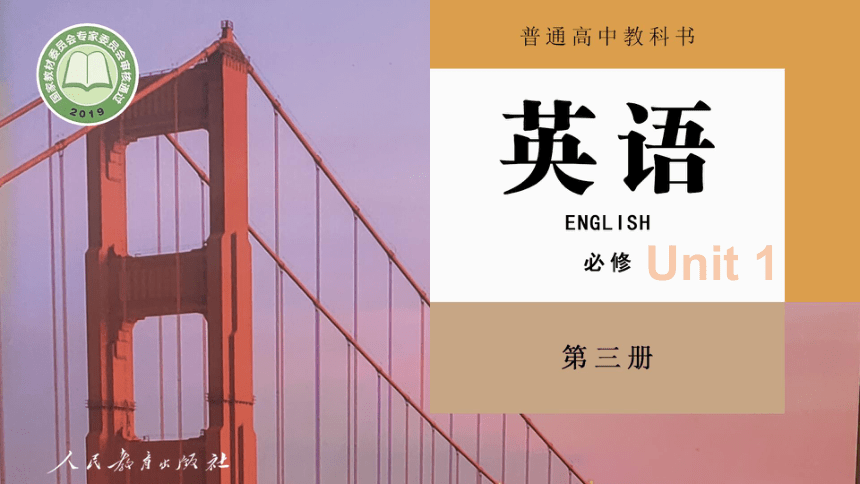 | |
| 格式 | ppt | ||
| 文件大小 | 6.4MB | ||
| 资源类型 | 教案 | ||
| 版本资源 | 人教版(2019) | ||
| 科目 | 英语 | ||
| 更新时间 | 2023-03-31 13:46:12 | ||
图片预览

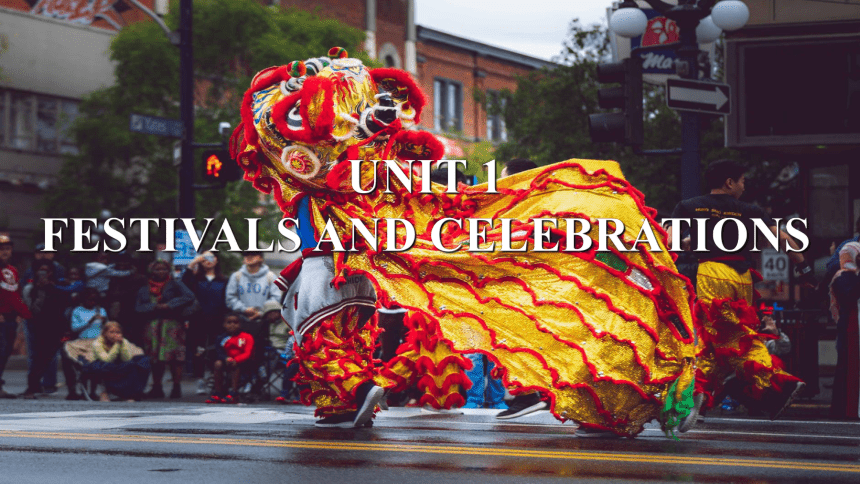
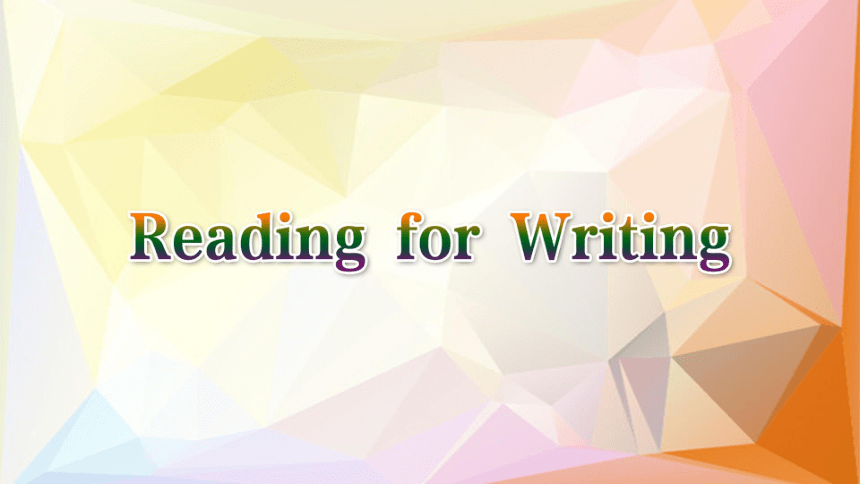
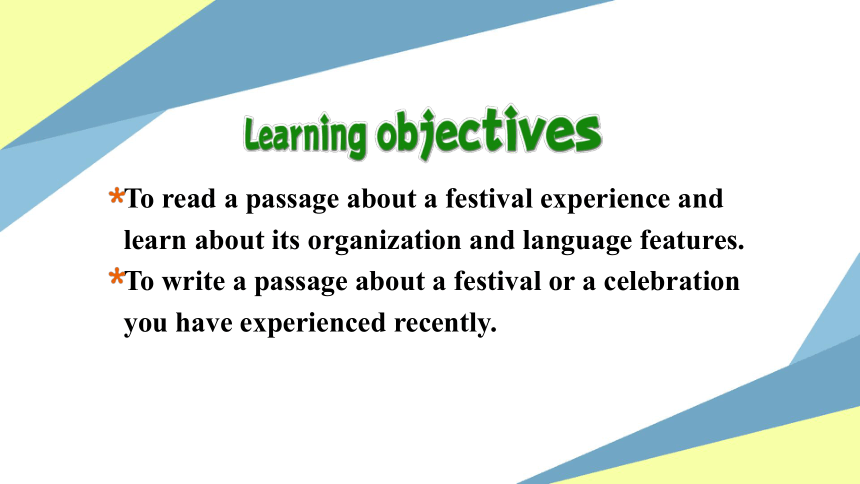
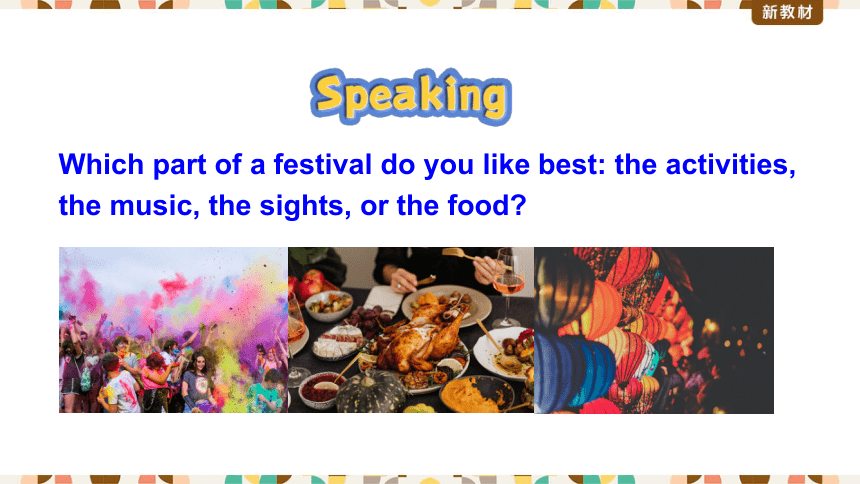
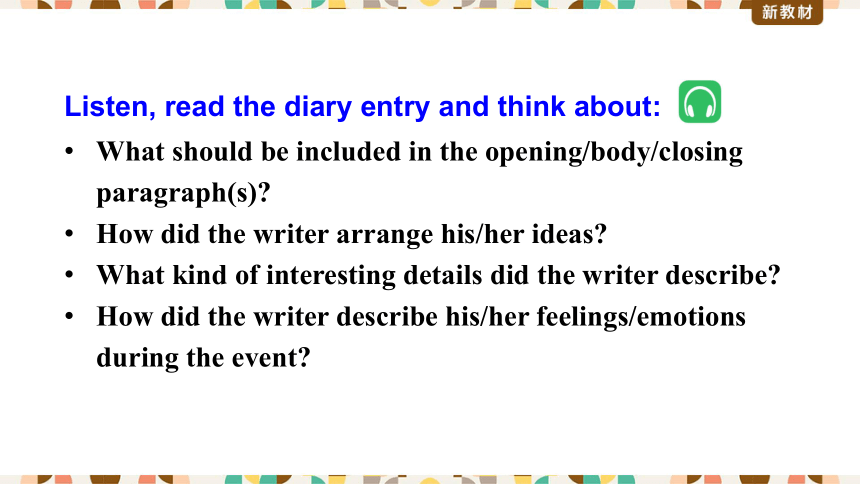
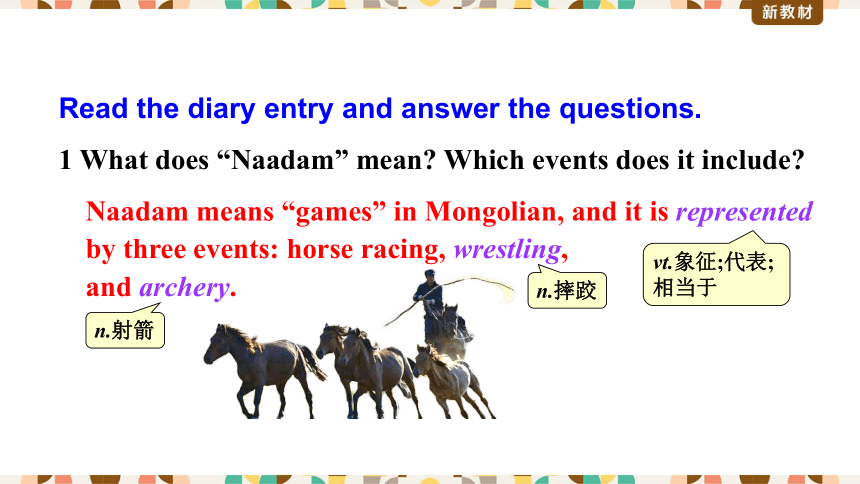
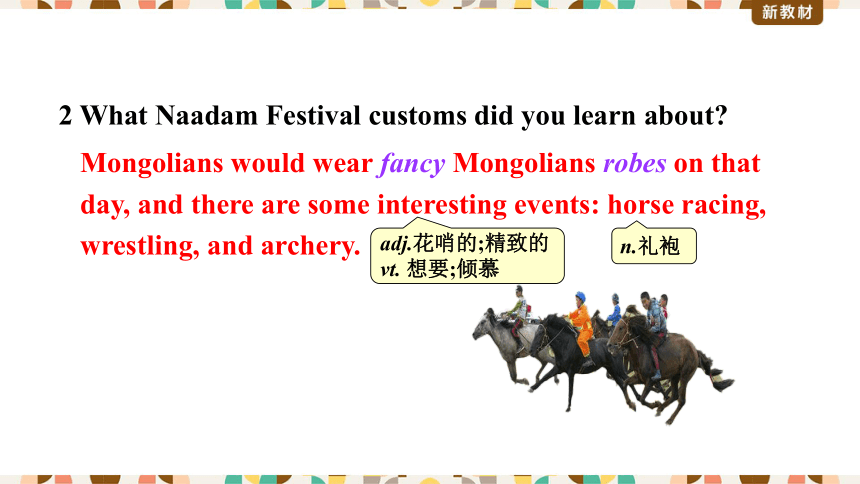
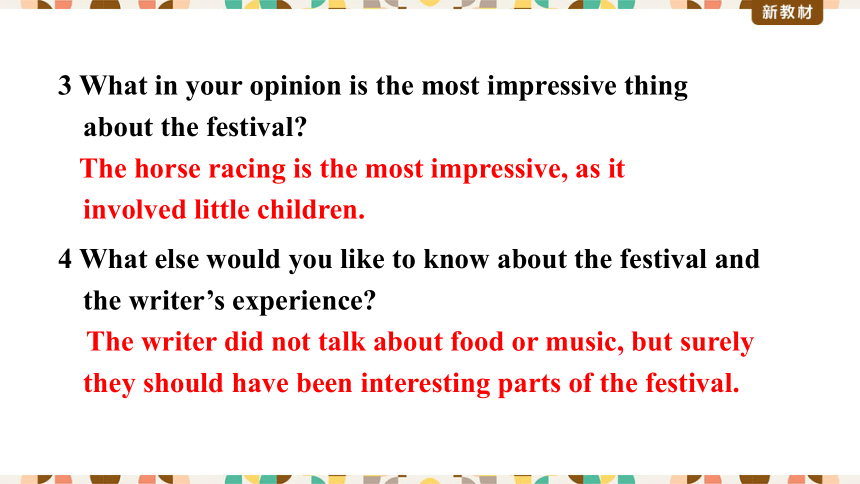
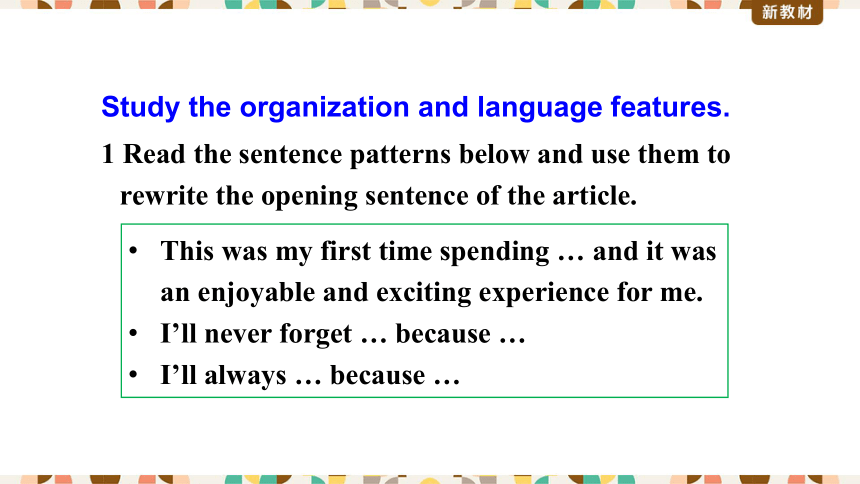
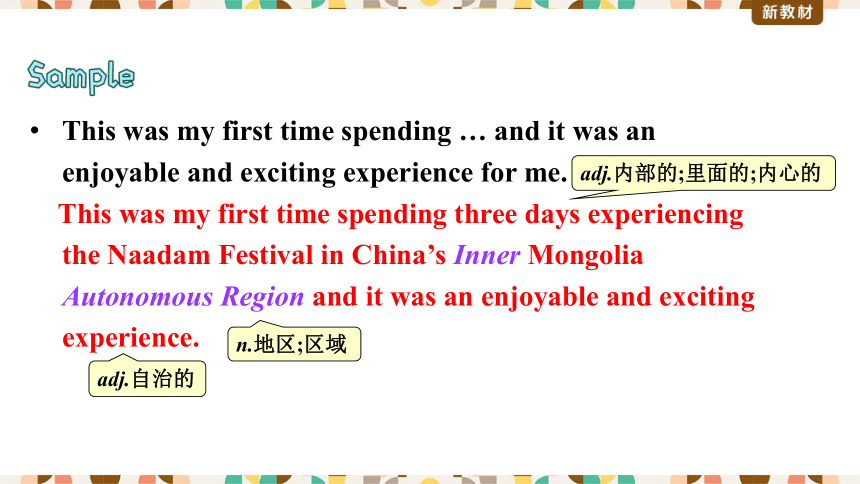
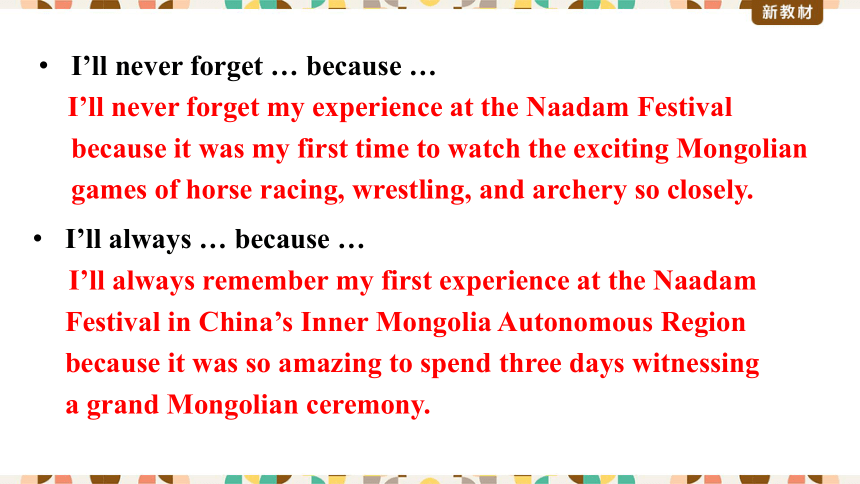
文档简介
(共39张PPT)
Unit 1
UNIT 1 FESTIVALS AND CELEBRATIONS
To read a passage about a festival experience and learn about its organization and language features.
To write a passage about a festival or a celebration you have experienced recently.
Which part of a festival do you like best: the activities, the music, the sights, or the food
What should be included in the opening/body/closing paragraph(s)
How did the writer arrange his/her ideas
What kind of interesting details did the writer describe
How did the writer describe his/her feelings/emotions during the event
Listen, read the diary entry and think about:
1 What does “Naadam” mean Which events does it include
Read the diary entry and answer the questions.
Naadam means “games” in Mongolian, and it is represented by three events: horse racing, wrestling,
and archery.
vt.象征;代表;相当于
n.摔跤
n.射箭
2 What Naadam Festival customs did you learn about
Mongolians would wear fancy Mongolians robes on that day, and there are some interesting events: horse racing, wrestling, and archery.
adj.花哨的;精致的
vt. 想要;倾慕
n.礼袍
3 What in your opinion is the most impressive thing about the festival
The horse racing is the most impressive, as it involved little children.
4 What else would you like to know about the festival and the writer’s experience
The writer did not talk about food or music, but surely they should have been interesting parts of the festival.
Study the organization and language features.
1 Read the sentence patterns below and use them to rewrite the opening sentence of the article.
This was my first time spending … and it was an enjoyable and exciting experience for me.
I’ll never forget … because …
I’ll always … because …
This was my first time spending … and it was an enjoyable and exciting experience for me.
This was my first time spending three days experiencing the Naadam Festival in China’s Inner Mongolia Autonomous Region and it was an enjoyable and exciting experience.
adj.自治的
adj.内部的;里面的;内心的
n.地区;区域
I’ll never forget … because …
I’ll never forget my experience at the Naadam Festival because it was my first time to watch the exciting Mongolian games of horse racing, wrestling, and archery so closely.
I’ll always … because …
I’ll always remember my first experience at the Naadam Festival in China’s Inner Mongolia Autonomous Region because it was so amazing to spend three days witnessing a grand Mongolian ceremony.
2 Underline the sentences that describe the writer’s feelings and emotions.
I was quite moved by…
I absolutely enjoyed the archery … but the horse races were my favorite part.
I was surprised to see that…
I was a little worried about the children’s safety.
feeling really tired …
was totally worth it.
I can’t wait!
…, which are all so exciting to watch!
Use what you have learnt to write about a festival or a celebration you have experienced recently.
1 Make notes of your ideas in the table and then write your draft.
Outline
The name of the festival/celebration: _____________
Main idea of each paragraph Details Feelings
1. The topic and my feeling
2. How I prepared for the festival/celebration
3. The festival/celebration activities
4. A summary of my festival/celebration experience
..., with a history of ..., is one of the most important traditional festivals in ...
... is celebrated on ...
... is having a good time, singing and dancing.
... is exciting and noisy.
... was / were filled with ...
2 Exchange drafts with a partner. Use the checklist to give feedback on your partner’s draft.
Is the writing well-organized
Is there an opening sentence in the first paragraph
Does each paragraph include the necessary details
Does the writer describe his/her feelings and emotions
Does the writer use the –ing form correctly in the writing
Are there any grammar, spelling, or punctuation errors
3 Get your draft back and revise it. And then put up you writing in your classroom or read it to the class.
一、审题定调
本写作任务要求记述一次自己的节日经历,属于记叙文。在介绍节日经历时,可以按照时间顺序或事件发展的顺序对节日经历或庆祝活动展开叙述。
二、谋篇布局
第一部分:点明节日并表明自己的感受;
第二部分:具体叙述节日前的准备和节日中的活动;
第三部分:总结节日经历。
My Experience During the Double Ninth Festival
As one of the most popular traditional festivals in China, the Double Ninth Festival is observed on the 9th day of the 9th lunar month, which is a great occasion to show respect for the elderly.
I still remember my family climbing Mount Songshan to celebrate the Double Ninth Festival last year. It took us an hour to get there by car. We stopped at the foot of the mountain and started climbing.
Since our grandfather is in his sixties, we walked slowly to make sure he was not too tired. We relaxed ourselves along the way by chatting with each other and taking photos. After we reached the top, we had a good rest. Then we took the cable cars (缆车) down the hill, which allowed us to enjoy the amazing sights.
The trip to Mount Songshan helped me to realize that it is important to have family trips so that we can communicate with each other and have fun together.
读后续写
阅读下面短文,根据所给情节进行续写,使之构成一个完整的故事。
Amanda felt as gray as the sky outside when she looked across the table at her little sister. Li sat on her seat, drinking from her cup.
“Mom, why does Li hate me ”
“Honey, she doesn’t hate you. Li is still getting used to you,” Mom said. “It’s only been two weeks.”
“But look,” Amanda took a cookie off her dish and held it out to Li. “Want to eat it ”
As soon as Li saw Amanda reaching over, her eyes widened. Li quickly got down from her seat and raced to her room.
“See ” Amanda said to Mom. “I thought being a big sister would be fun.”
Over a year ago, Amanda’s parents said that they were adopting (收养) a daughter from China, and Amanda had danced with excitement. She’d dreamed of taking her sister to the park, reading books to her, and teaching her to ride a bicycle. That hadn’t happened.
“She runs away whenever I get close,” Amanda said.
Mom took Amanda’s hand. “Think of how frightening it is for her. She’s in a new country with a new family.”
“I just wish I knew how to help her,” Amanda said, thinking of Li’s frightened eyes.
Amanda went into the family room and sat down on the sofa. How could she help Li She’d sung songs to her, drawn pictures for her, and made funny faces. None of that had worked.
Amanda turned on the TV. She stopped to watch a film about a dog and a cat. The film was in another language. The show looked funny, but she didn’t understand any of it. It made Amanda remember when they were in China. She had gotten frustrated (沮丧的) when people talked in Chinese.
That’s it. Amanda turned off the TV and sped to her room. She found the CDs Aunt Linda gave her last year to help her learn some Chinese.
Amanda tiptoed (踮着脚走) to Li’s room. Looking in, Amanda saw Li curled up (蜷缩) in a ball on her bed. She could hear Li sobbing (啜泣). Amanda knocked on the open door.
Li moved to the back of her bed.
注意:1. 所续写短文的词数应为150左右;
2. 续写部分分为两段,每段的开头语已写好;
Paragraph 1:
“Ni hao,” Amanda said, hoping she had pronounced it right.
___________________________________________________
Paragraph 2:
When she didn’t hear any sobs, Amanda looked over at the bed and saw Li smiling.
___________________________________________________
“Ni hao,” Amanda said, hoping she had pronounced it right. Li didn’t answer, but she didn't shout, either. Amanda crossed the room to Li's pink CD player. “Do you like music ” Li didn’t answer, just looking at Amanda. Amanda put the CD into the player. Voices of children filled the room. “Yi, er, san,” sang the voices on the tape. “In English, that means one, two, three,” Amanda said. She didn't look at Li, afraid that Li would start crying and run away.
When she didn’t hear any sobs, Amanda looked over at the bed and saw Li smiling. “Yi, er, san!” sang Li, clapping her hands. A few songs later, Amanda’s mom came to the door. Amanda and Li were side by side. “I found the CDs Aunt Linda gave me last year to help me learn some Chinese,” Amanda explained. “I thought that Li might know these songs.” “What a great idea,” Mom said. “Jie jie,” Li said, pointing at Amanda. Amanda felt a rush of excitement. “That means big sister.” She smiled at Li. “And you’re my mei mei.”
1. Naadam means “games” in Mongolian, and it is represented by three events …
represent vt. to be a symbol of something; to officially speak or take action for another person or group of people; to form or be something 象征;代表;相当于
【拓展】
representation n. 表现,描述
representative n. 代表,有代表性的事物
adj. 有代表性的
eg Brown areas represent deserts on the map.
This treatment represents a significant advance in the field of cancer research.
Mr. Smith was chosen to represent the company at the meeting.
2. On the first day, I set off to the games early with my friend Burin.
set off 出发;使爆炸;触发警报;引发
eg Having said farewell to their friends, they set off for home.
Any movement could have set off the bomb.
Smoke from a cigarette will not normally set off a smoke alarm.
If he attended a party without his wife and children, it set off a storm of speculation (猜疑).
【拓展】set短语
set up 设置;建立;设立
set down 让某人下车;写下
set about 着手做
set out 启程;开始工作
set apart 使分离,使分开
set aside 放在一边,节省、保留(钱或时间)
set free 释放
set an example to 为……树立榜样
【语境应用】完成句子。
1) If you really want to see the movie, we’d better ________ for the cinema now.
2) Alice Moore is a teenager entrepreneur (创业者), who in May 2015 ________ her business Alice Candy.
3) They ________ the task of creating a new Web site.
4) After the Civil War, the Southern slaves were ________.
set off
set up
set about
set free
3. That was the moment I started to understand why people say “Horses are at the heart of Mongolian culture”.
moment n. a very short period of time 片刻;瞬间
eg He was here a moment ago.
Can you spare a few moments to answer some questions
To be frank, that was one of the happiest moments of my life.
【拓展】moment短语
at the moment 此刻
at any moment 很快;随时
in a moment 片刻之后
for a moment 片刻,一会儿
for the moment 暂时,目前
the moment that 一……就……
【语境应用】 完成句子。
1) He told me I could call him _____________.
他告我随时可以给他打电话。
2) I thought _______________ before I remembered her name.
我想了一会才记起她的名字。
at any moment
for a moment
4. I’m finally back home now, feeling really tired, but celebrating Naadam with my friend was totally worth it.
be worth it 值得做……
be not worth it 不值得做……
eg It took us at least three hours to get to the top of the mountain, but the view up there is worth it.
A: Shall we go and see the museum
B: No, it’s not worth it.
adj. 值(多少钱),相当于……的价值;值得
n. 价值,作用
eg This old book is worth 300 dollars.
The book is well worth reading.
The worth of the book was not realized until a hundred years after his death.
worth
【语境应用】 完成句子。
1) The local museum ___________________________ (值得参观).
2) Who knows ___________________________ (这幅画值多少钱)
3) The activities help children to develop a sense of ________________ (自身价值).
is worth a visit/is worth visiting
how much the painting is worth
their own worth
Finish your writing about your festival experience and exchange it with your partner and then revise it.
Unit 1
UNIT 1 FESTIVALS AND CELEBRATIONS
To read a passage about a festival experience and learn about its organization and language features.
To write a passage about a festival or a celebration you have experienced recently.
Which part of a festival do you like best: the activities, the music, the sights, or the food
What should be included in the opening/body/closing paragraph(s)
How did the writer arrange his/her ideas
What kind of interesting details did the writer describe
How did the writer describe his/her feelings/emotions during the event
Listen, read the diary entry and think about:
1 What does “Naadam” mean Which events does it include
Read the diary entry and answer the questions.
Naadam means “games” in Mongolian, and it is represented by three events: horse racing, wrestling,
and archery.
vt.象征;代表;相当于
n.摔跤
n.射箭
2 What Naadam Festival customs did you learn about
Mongolians would wear fancy Mongolians robes on that day, and there are some interesting events: horse racing, wrestling, and archery.
adj.花哨的;精致的
vt. 想要;倾慕
n.礼袍
3 What in your opinion is the most impressive thing about the festival
The horse racing is the most impressive, as it involved little children.
4 What else would you like to know about the festival and the writer’s experience
The writer did not talk about food or music, but surely they should have been interesting parts of the festival.
Study the organization and language features.
1 Read the sentence patterns below and use them to rewrite the opening sentence of the article.
This was my first time spending … and it was an enjoyable and exciting experience for me.
I’ll never forget … because …
I’ll always … because …
This was my first time spending … and it was an enjoyable and exciting experience for me.
This was my first time spending three days experiencing the Naadam Festival in China’s Inner Mongolia Autonomous Region and it was an enjoyable and exciting experience.
adj.自治的
adj.内部的;里面的;内心的
n.地区;区域
I’ll never forget … because …
I’ll never forget my experience at the Naadam Festival because it was my first time to watch the exciting Mongolian games of horse racing, wrestling, and archery so closely.
I’ll always … because …
I’ll always remember my first experience at the Naadam Festival in China’s Inner Mongolia Autonomous Region because it was so amazing to spend three days witnessing a grand Mongolian ceremony.
2 Underline the sentences that describe the writer’s feelings and emotions.
I was quite moved by…
I absolutely enjoyed the archery … but the horse races were my favorite part.
I was surprised to see that…
I was a little worried about the children’s safety.
feeling really tired …
was totally worth it.
I can’t wait!
…, which are all so exciting to watch!
Use what you have learnt to write about a festival or a celebration you have experienced recently.
1 Make notes of your ideas in the table and then write your draft.
Outline
The name of the festival/celebration: _____________
Main idea of each paragraph Details Feelings
1. The topic and my feeling
2. How I prepared for the festival/celebration
3. The festival/celebration activities
4. A summary of my festival/celebration experience
..., with a history of ..., is one of the most important traditional festivals in ...
... is celebrated on ...
... is having a good time, singing and dancing.
... is exciting and noisy.
... was / were filled with ...
2 Exchange drafts with a partner. Use the checklist to give feedback on your partner’s draft.
Is the writing well-organized
Is there an opening sentence in the first paragraph
Does each paragraph include the necessary details
Does the writer describe his/her feelings and emotions
Does the writer use the –ing form correctly in the writing
Are there any grammar, spelling, or punctuation errors
3 Get your draft back and revise it. And then put up you writing in your classroom or read it to the class.
一、审题定调
本写作任务要求记述一次自己的节日经历,属于记叙文。在介绍节日经历时,可以按照时间顺序或事件发展的顺序对节日经历或庆祝活动展开叙述。
二、谋篇布局
第一部分:点明节日并表明自己的感受;
第二部分:具体叙述节日前的准备和节日中的活动;
第三部分:总结节日经历。
My Experience During the Double Ninth Festival
As one of the most popular traditional festivals in China, the Double Ninth Festival is observed on the 9th day of the 9th lunar month, which is a great occasion to show respect for the elderly.
I still remember my family climbing Mount Songshan to celebrate the Double Ninth Festival last year. It took us an hour to get there by car. We stopped at the foot of the mountain and started climbing.
Since our grandfather is in his sixties, we walked slowly to make sure he was not too tired. We relaxed ourselves along the way by chatting with each other and taking photos. After we reached the top, we had a good rest. Then we took the cable cars (缆车) down the hill, which allowed us to enjoy the amazing sights.
The trip to Mount Songshan helped me to realize that it is important to have family trips so that we can communicate with each other and have fun together.
读后续写
阅读下面短文,根据所给情节进行续写,使之构成一个完整的故事。
Amanda felt as gray as the sky outside when she looked across the table at her little sister. Li sat on her seat, drinking from her cup.
“Mom, why does Li hate me ”
“Honey, she doesn’t hate you. Li is still getting used to you,” Mom said. “It’s only been two weeks.”
“But look,” Amanda took a cookie off her dish and held it out to Li. “Want to eat it ”
As soon as Li saw Amanda reaching over, her eyes widened. Li quickly got down from her seat and raced to her room.
“See ” Amanda said to Mom. “I thought being a big sister would be fun.”
Over a year ago, Amanda’s parents said that they were adopting (收养) a daughter from China, and Amanda had danced with excitement. She’d dreamed of taking her sister to the park, reading books to her, and teaching her to ride a bicycle. That hadn’t happened.
“She runs away whenever I get close,” Amanda said.
Mom took Amanda’s hand. “Think of how frightening it is for her. She’s in a new country with a new family.”
“I just wish I knew how to help her,” Amanda said, thinking of Li’s frightened eyes.
Amanda went into the family room and sat down on the sofa. How could she help Li She’d sung songs to her, drawn pictures for her, and made funny faces. None of that had worked.
Amanda turned on the TV. She stopped to watch a film about a dog and a cat. The film was in another language. The show looked funny, but she didn’t understand any of it. It made Amanda remember when they were in China. She had gotten frustrated (沮丧的) when people talked in Chinese.
That’s it. Amanda turned off the TV and sped to her room. She found the CDs Aunt Linda gave her last year to help her learn some Chinese.
Amanda tiptoed (踮着脚走) to Li’s room. Looking in, Amanda saw Li curled up (蜷缩) in a ball on her bed. She could hear Li sobbing (啜泣). Amanda knocked on the open door.
Li moved to the back of her bed.
注意:1. 所续写短文的词数应为150左右;
2. 续写部分分为两段,每段的开头语已写好;
Paragraph 1:
“Ni hao,” Amanda said, hoping she had pronounced it right.
___________________________________________________
Paragraph 2:
When she didn’t hear any sobs, Amanda looked over at the bed and saw Li smiling.
___________________________________________________
“Ni hao,” Amanda said, hoping she had pronounced it right. Li didn’t answer, but she didn't shout, either. Amanda crossed the room to Li's pink CD player. “Do you like music ” Li didn’t answer, just looking at Amanda. Amanda put the CD into the player. Voices of children filled the room. “Yi, er, san,” sang the voices on the tape. “In English, that means one, two, three,” Amanda said. She didn't look at Li, afraid that Li would start crying and run away.
When she didn’t hear any sobs, Amanda looked over at the bed and saw Li smiling. “Yi, er, san!” sang Li, clapping her hands. A few songs later, Amanda’s mom came to the door. Amanda and Li were side by side. “I found the CDs Aunt Linda gave me last year to help me learn some Chinese,” Amanda explained. “I thought that Li might know these songs.” “What a great idea,” Mom said. “Jie jie,” Li said, pointing at Amanda. Amanda felt a rush of excitement. “That means big sister.” She smiled at Li. “And you’re my mei mei.”
1. Naadam means “games” in Mongolian, and it is represented by three events …
represent vt. to be a symbol of something; to officially speak or take action for another person or group of people; to form or be something 象征;代表;相当于
【拓展】
representation n. 表现,描述
representative n. 代表,有代表性的事物
adj. 有代表性的
eg Brown areas represent deserts on the map.
This treatment represents a significant advance in the field of cancer research.
Mr. Smith was chosen to represent the company at the meeting.
2. On the first day, I set off to the games early with my friend Burin.
set off 出发;使爆炸;触发警报;引发
eg Having said farewell to their friends, they set off for home.
Any movement could have set off the bomb.
Smoke from a cigarette will not normally set off a smoke alarm.
If he attended a party without his wife and children, it set off a storm of speculation (猜疑).
【拓展】set短语
set up 设置;建立;设立
set down 让某人下车;写下
set about 着手做
set out 启程;开始工作
set apart 使分离,使分开
set aside 放在一边,节省、保留(钱或时间)
set free 释放
set an example to 为……树立榜样
【语境应用】完成句子。
1) If you really want to see the movie, we’d better ________ for the cinema now.
2) Alice Moore is a teenager entrepreneur (创业者), who in May 2015 ________ her business Alice Candy.
3) They ________ the task of creating a new Web site.
4) After the Civil War, the Southern slaves were ________.
set off
set up
set about
set free
3. That was the moment I started to understand why people say “Horses are at the heart of Mongolian culture”.
moment n. a very short period of time 片刻;瞬间
eg He was here a moment ago.
Can you spare a few moments to answer some questions
To be frank, that was one of the happiest moments of my life.
【拓展】moment短语
at the moment 此刻
at any moment 很快;随时
in a moment 片刻之后
for a moment 片刻,一会儿
for the moment 暂时,目前
the moment that 一……就……
【语境应用】 完成句子。
1) He told me I could call him _____________.
他告我随时可以给他打电话。
2) I thought _______________ before I remembered her name.
我想了一会才记起她的名字。
at any moment
for a moment
4. I’m finally back home now, feeling really tired, but celebrating Naadam with my friend was totally worth it.
be worth it 值得做……
be not worth it 不值得做……
eg It took us at least three hours to get to the top of the mountain, but the view up there is worth it.
A: Shall we go and see the museum
B: No, it’s not worth it.
adj. 值(多少钱),相当于……的价值;值得
n. 价值,作用
eg This old book is worth 300 dollars.
The book is well worth reading.
The worth of the book was not realized until a hundred years after his death.
worth
【语境应用】 完成句子。
1) The local museum ___________________________ (值得参观).
2) Who knows ___________________________ (这幅画值多少钱)
3) The activities help children to develop a sense of ________________ (自身价值).
is worth a visit/is worth visiting
how much the painting is worth
their own worth
Finish your writing about your festival experience and exchange it with your partner and then revise it.
